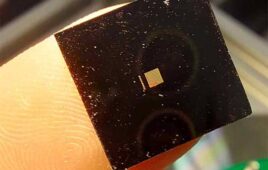
This lung-on-a-chip serves as an accurate model of human lungs to test for drug safety and efficacy. [Image from Wyss Institute for Biologically Inspired Engineering, Harvard University]
The funding will go toward the first phase of a five-year program.
Even though pre-clinical studies using cell and animal research models are promising, more than 60% of investigational drugs fail in human trials because of ineffectiveness. The NIH hopes to change that with the funding by developing 3D microphysiological system platforms that replicate human disease. The platforms, known as tissue chips, are able to support living cells and human tissues to replicate complex biological functions of human organs and systems, creating a better way to test potential drug efficacy.
The Tissue Chip for Disease Modeling and Efficacy Testing awards will help scientists understand how diseases work to be able to predict more accurately how certain drugs will affect patients.
“The goal is for these tissue chips to provide more accurate platforms to understand diseases, and to be more predictive of the human response to drugs than current research models, thereby improving the success rate of candidate drugs in human clinical trials,” Christopher P. Austin, National Center for Advancing Translational Sciences’ director, said in a press release.
NCATS started a Tissue Chip program in 2012 to create micro physiological systems to study the safety and toxicity of drugs in a faster and more effective way. The tissue chips are able to be combined to create a human body-on-a-chip to give researchers an easier way to study investigational drugs and therapeutic agents in the body before it goes to clinical trial.
The new awards will enable researchers to study a variety of common and rare diseases like rheumatoid arthritis, kidney disease, human influenza A viral infection, amyotrophic lateral sclerosis (ALS), hereditary hemorrhagic telangiectasia and arrhythmogenic cardiomyopathy.
Once the first phase is complete, the second phase of awards will partner researchers and pharmaceutical companies together to determine the effectiveness of drugs in validated disease models.
The awardees of the grants include Brigham and Women’s Hospital, Cedars-Sinai Medical Center, Columbia University, Duke University, Harvard University, Northwestern University, University of California Davis, University of California Irvine, University of Pittsburgh, University of Rochester, University of Washington and Vanderbilt University.




